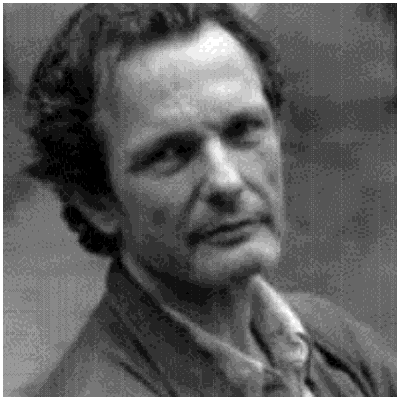Richard Gwyn
(Alcemi)

We get to trail after him through the places where he may have picked up this disease. He takes us on a whirlwind series of drunken journeys though France, Spain, Italy, Greece, Crete --- and perhaps into some of the hidden harbors of the soul.
He is a dyed-in-the-wool abuser of mind and body, one of those guys that wander around the city smelling of bad whiskey, old vomit, and last year's BO, eyes glazed with some unimaginable combination of drink and drug ... a charter member of that shambling mob of bums that live in the seedy streets of Barcelona or Paris or Milan or Athens ... demanding that you hand over your francs or lira or pesetas or drachma. Or a drink; or a toot.
In brief, he's a general blight on the human race.
Gwyn is not your typical vago, however. This guy studied anthropology at the London School of Economics, writes poetry, can play the piano, the violin, the accordion. He can pick up a language in no time, has written studies of modalities of patients (and staff) in hospitals. "I have a PhD in the narrative construction of illness experience," he tells us, improbably. He worships at the shrine of Bach and of Glenn Gould, gives poetry readings and goes to literary conferences, and uses big words. too. Although not here.
He reads voraciously, "has an attic full of books," speaks knowingly of the writings of Javier Marías, Susan Sontag, Baudelaire, DeLillo, Kazantzakis, Céline, Villon, Montaigne, Borges ... as well as some of the more obscure writers, including Howdy Doody's sister, Margaret Anne Doody. And Roberto Bolaño.
Gwyn claims to have (drunkenly) met the latter, spent an evening arguing avant-garde literature with him in a dive in south-west France, which may elevate him from being your common on (or off) the wall throw-up and fight-you-in-the-alley drunk. If he pals around with Bolaño, he's a man with class, and maybe even smarts.
His spasms of bummery come and go (in his life, in this book). One minute he's tending gardens in Zakinthos, the next day he's out on a bender in Splanzia. From our reading here, we probably would not want to know him during reprobate times, the times when booze and drugs run his life. As a literary character, however, he's someone you might want to spend time with. I just spent three days with him, because this is a won't-leave-you-alone-until-you're-done-with-it book. And I am (reluctantly) done with it. It is now all yours.

- On a rare visit to England I fell, or rather rolled into the River Severn at Shrewsbury, whereupon I was taken to the psychiatric hospital and shut up in a locked ward on suspicion of being an attempted suicide, in spite of my protestations that suicide was not an option since, like Prometheus, I could not die --- an argument which failed to convince the duty psychiatrist.
It is obvious that there is an element of the drunken braggart here, with tales common to that ilk. But Gwyn is better than that, for he spaces out the sleep-in-the-gutter stories with genuinely penetrating, and at times, beautiful riffs on various elegant subjects. Like:
- Drinking and self-esteem. "My self-esteem had sunk so low that I couldn't bear to cadge a bed for the night off any of the friends who were still speaking to me, and had been evicted from the local soup kitchen for trying to stop a fight, or starting one, I forget."
- Addiction. "I became living evidence of the axiom that addicts don't have relationships --- they take hostages."
- Holes in the memory, fade-outs: He was once in Burgos, but he cannot remember arriving or departing, which "make me question whether I was ever there at all, or if indeed, I went there once, and died from some species of forlorn heroism, and therefore never left, and am a ghost perpetually circling the grandiose and idiotic statue of El Cid." (His failing liver also causes him to black out, making it impossible for him to drive.)
- Liver transplants. Towards the end of The Vagabond's Breakfast, we get to go with him through a liver transplant operation. His doctor tells him it was an unusually large liver, and we have a picture of his surgeon manfully stuffing this giant beast of a liver into a tiny cavity somewhere around the middle of Gwyn's body. Getting someone else's vital organ put in your body, he advises us, creates what might be seen as an off-shoot of post-partum depression. After the transplant, Gwyn says, "I feel at a remove from my own physical person, this immovable object to which I am attached and which now contains a large element of the not-me."
- Datura, or jimson weed. During one of his meanderings around various Greek islands, he and some friends ended up in a secluded valley where they brewed up the seeds of the datura (also known, he reports, as "the thorn-apple, or devil's weed.") It is "a dangerous sort of plant," he reveals, which I believe after reading his account of it, which we include as a link to this review. He quotes a Spanish encyclopedia article that says that the plant "grows freely in most areas, especially scrubland, backyards and at roadsides, and is easily found, except by those who are specifically looking for it." (He comments, "this qualification seemed out of place in a reference book.")
- Insomnia. He shares that malady with Dickens and Bonaparte --- and his personal bug-a-boo, Margaret Thatcher. And, he is, along with Emil Ciordan and Vladimir Nabokov and S. J. Perelman, one of the great chroniclers of that sad state:
-
Let me make it clear that insomnia is not a question of simply not being able to get sleep --- it is, cumulatively, a massive derangement of the senses, a perpendicular longing, a lacuna within narrative time, a backsliding acceleration into the entrails of the night ... I have discovered that my average daily consumption of sleep is around two hours ... If I manage to get three hours in one uninterrupted session I wake up with the gratification of a small triumph, as if I had gorged myself on sleep, outwitting the phantoms of sleeplessness, who plot against me, and I imagine to be my enemies. I know I am deranged, but the ghosts are real.
It is a double whammy, as we part-time insomniacs can attest. Not only do we lose hours of being out-of-it at night, the days afterwards can be a wasteland: "My brain is not functioning as it should. It hurts me to think. I earn my living principally by thinking, and it hurts me to think." It hurts to think. And he adds, with melancholia, "That cannot be good."
I was charmed to death by Gwyn's writing, and his life, and his astonishing journeys. It is like the best of Henry Miller, or Lawrence Durrell, or --- even better --- it reminded me, in the sheer abandon and the poetry of it, of the time that Jean Genet spent on the road, which he reported so poetically in The Thief's Journal.